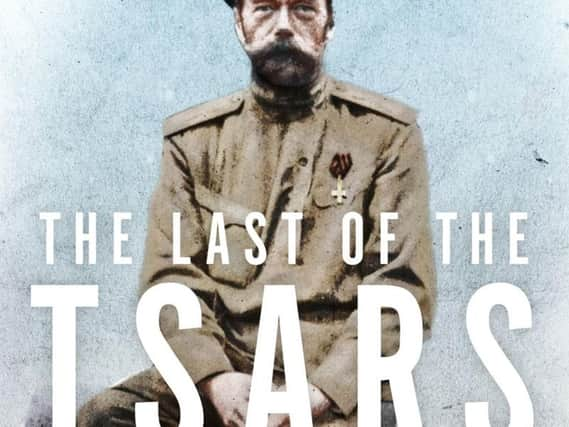Book review: The Last of the Tsars: Nicholas II and the Russian Revolution by Robert Service


But could one of the most controversial figures in 20th century history have simply been both things at the same time?
Much has been written about Tsar Nicholas II, the last leader of the powerful 300-year-old Romanov dynasty, and his family, all notoriously slaughtered by a Bolshevik firing squad in the bleak cellar room of a house in the Urals city of Ekaterinburg 100 years ago.
Advertisement
Hide AdAdvertisement
Hide AdFrom films and books to the emergence of countless impostors claiming to be members of the Romanov family, including Polish woman Anna Anderson posing as the Tsar’s youngest daughter Anastasia, the story of a ruler toppled by revolution has become legendary.
In his empirical, pragmatic and extensively researched account of the last 16 months of the Tsar’s life and reign, Robert Service, an eminent historian of Russia, strips away the myths and casts a strictly non-partisan and piercing new light on a complex and contradictory man caught up in the vortex of one of the most violent periods of European history.
As well as studying Nicholas’s thoughts and experiences, Service takes us beyond his quasi prison walls to the political, economic and social upheaval in Russia in the aftermath of Alexander Kerensky’s February Revolution, the Bolshevik seizure of power in October 1917 and the beginnings of Lenin’s Soviet republic.
Service, who was determined to almost literally read between the lines of old and new documentation relating to the last months of the Tsar to gain new insight into his political purposes, examined in detail Nicholas’s diaries, recorded conversations and even the Tsar’s choice of books as he whiled away his enforced captivity.
Advertisement
Hide AdAdvertisement
Hide AdAnd what he found was startling evidence of the kind of ruler Nicholas believed himself to have been, a perception totally at odds with the disastrous reality. Here was a man almost entirely out of his depth, and perhaps even wilfully so, dying as a political victim rather than the martyr that many have made him.
In March of 1917, Nicholas had abdicated and he and his family were held under detention at first at Tsarskoe Selo, their home near St Petersburg and later at Tobolsk in Siberia and then at the claustrophobic Ipatiev House in Ekaterinburg where Nicholas, his German-born wife Alexandra and their five children – collectively codenamed ‘the baggage’ by the Bolsheviks – were brutally mown down in July of 1918.
For a tsar with a firm belief in his divine right to rule, Nicholas had appeared more than willing to abdicate in favour of his brother Grand Duke Mikhail who instantly declined the poisoned chalice. The Tsar’s decision to go was almost certainly based on his concern that his haemophiliac son and heir, the Tsarevich Alexei, was too sick to take the throne.
But Service paints a picture of a man who had never been truly interested in power, claiming that his competence to oversee the governance of Russia ‘had never been better than average, and his autocratic wilfulness wrecked any chances of a gradual transition to a more balanced constitution.’
Advertisement
Hide AdAdvertisement
Hide AdThe author is also unconvinced by images of him as a blameless monarch, asserting that both in and out of power, the last Tsar was ‘a nationalist extremist, a deluded nostalgist and a virulent anti-Semite.’
And claims that the Tsar and his family might have been saved if his English cousin George V had not overruled the idea that they be allowed to find exile in Britain are also debunked by Service on the grounds that they would never have been allowed to leave because of the weight of political obstacles in Russia.
In 1997, the 80th anniversary of the killing of the Romanovs, Russia’s President Boris Yeltsin marked the occasion by the reburial of the royal family’s remains in St Petersburg’s Peter and Paul Cathedral and three years later, the family was awarded a partial canonisation.
Undoubtedly a devoted husband and father, Nicholas was yet a weak and ineffective ruler and even when he was no longer at the helm and had time reflect on and recognise his mistakes, he never expressed regret that he had been so intransigent to change and the formation of a constitutional monarchy.
Advertisement
Hide AdAdvertisement
Hide AdSearingly honest, refreshingly impartial and immaculately detailed, The Last of the Tsars gives Nicholas a fair trial, revealing the uncomfortable truths of a weak man so eminently unsuited to his role, but whose ruthless despatch still has the power to shock.
(Macmillan, hardback, £25)